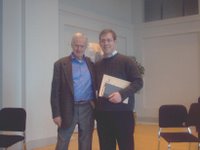Sunday, February 26, 2006
Ned Rorem's "Our Town"

The debate can be made over whether or not a particular composition is a masterpiece (or perhaps a specific performance of a particular work makes it a masterpiece?). This is a subjective matter that cannot be proven (much like science/faith cannot prove faith/science, music theory/composition cannot prove composition/music theory). I will not waste time arguing that a musical composition is or is not a repertoire must-have, but I will say that Ned Rorem’s latest opera Our Town, with libretto by J.D. McClatchy, will rise to the top of every opera company’s list.
The Indiana University opera program delivered the world premiere this past weekend. Two nights, double-cast. My wife and I attended the second performance on Saturday, including an afternoon of activities.
The afternoon began with a “masterclass,” led by Mr. Rorem, working with IU students on a few chamber works. The works prepared spanned his creative output from 1979 to 2003. In light of some previous discussions about composers supervising rehearsals and giving masterclasses, I can say that Mr. Rorem was gentle, gracious, but clear in his direction and desire. The performers prepared the music under the coaching of Sharon Laredo, a close friend of Mr. Rorem. It was a fulfilling and meaningful experience, and included some photo opportunities, autographs, and small talk.
Our Town was a compelling work. The stage was set to a minimum, using bare wood chairs and tables as the only props. A video screed projecting period images from the turn of the century were aides to the “stage manager” narrating. It felt like we were sitting in the middle of a guided tour and scrapbook.
The music was beautiful. It did not contain arias or recitatives. It did not beg Olympic athleticism from the singers. The music was propelled by intimate songs and choral writing, each exhibiting graceful line and clear, appropriate harmonizations. I felt challenged musically, but it was clear that I was to be enveloped in an experience, not leave puzzled over musical equations.
Rorem uses a moderate size orchestra (six winds, three brass, piano, and strings) with no percussion. In a pre-concert discussion Rorem admitted, “I feel the use of percussion immoral.” The orchestration was clear and decisive, with every decision made purposefully and intelligently. To tie into another S21 recent discussion about orchestration, Rorem (whose non-vocal music is underrated) deserves to be taught firmly alongside Stravinsky, Copland, and Ravel. The singers were able to tell their story without having to fight with the orchestra. Each instrument in the pit, likewise, was able to “tell a story” without overwhelming the stage or audience. Our Town makes a strong argument for rethinking my own (and perhaps other composers’) use of percussion.
Will Our Town become a “masterpiece” in the repertoire? I hope. If it does not, there is not much hope for anyone else.
posted by Daniel Gilliam
12:16 PM
|




